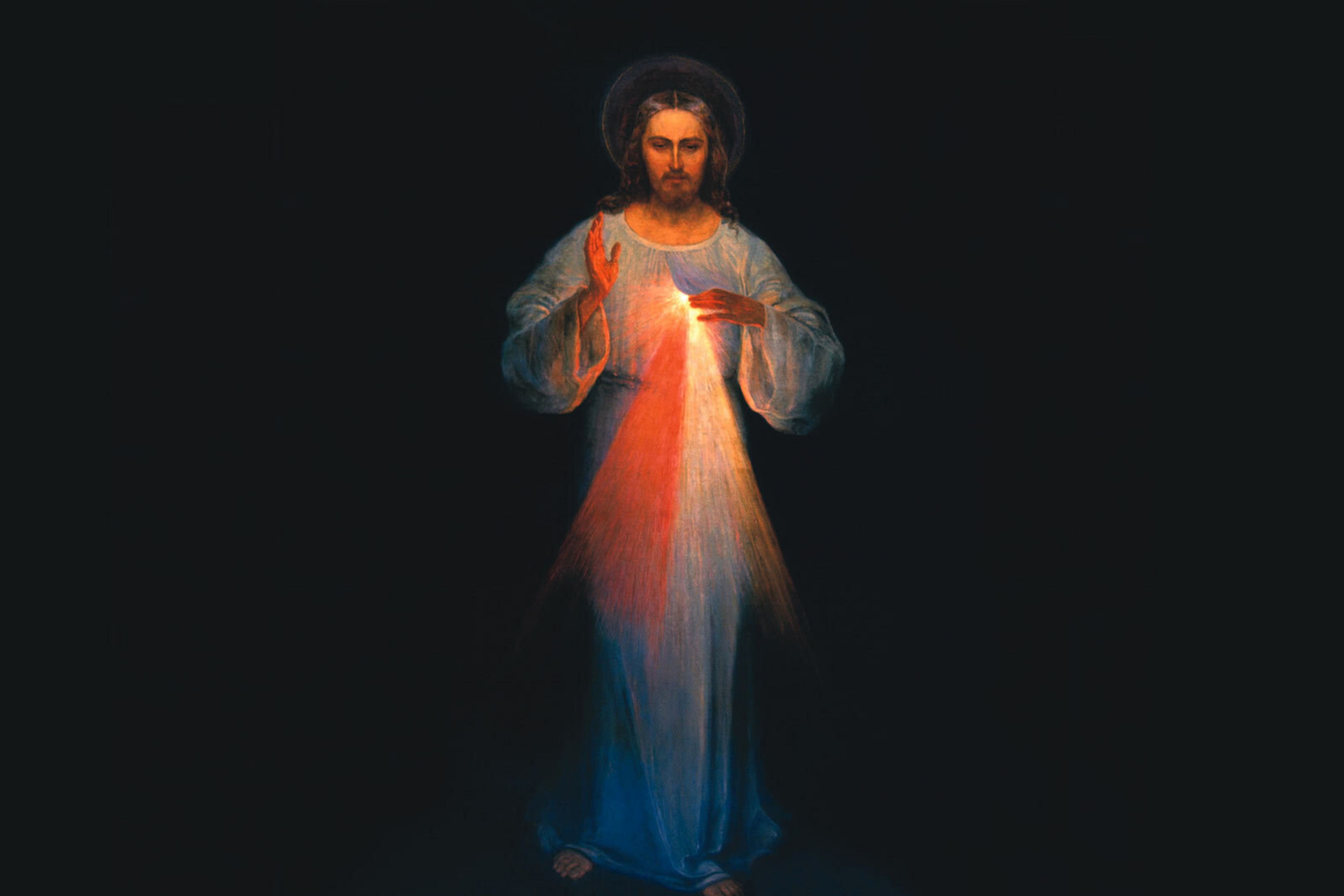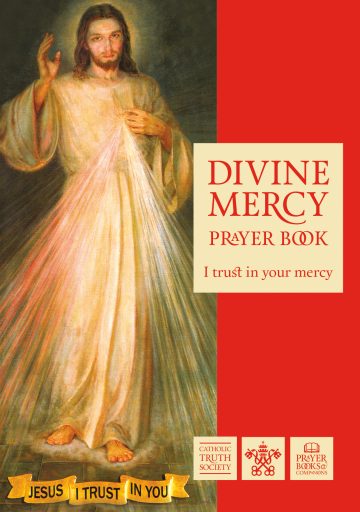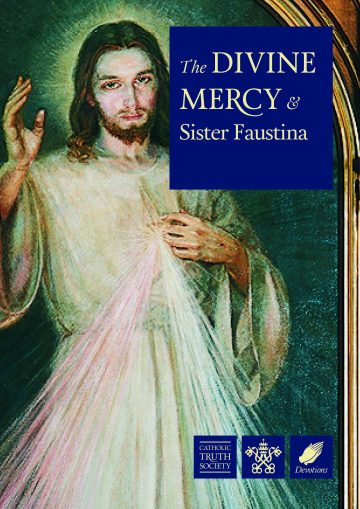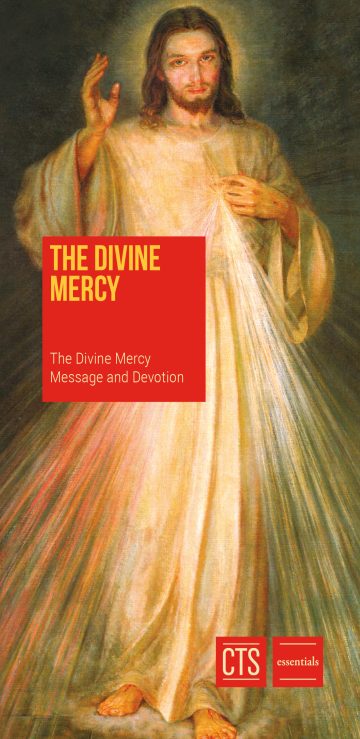The message of the Divine Mercy is nothing new, just a reminder of what the Church has always taught: that God is merciful and forgiving and that we, too, must show mercy and forgiveness.
Sr Faustina
Saint Maria Faustina Kowalska (1905-1938), a Polish nun, an apostle of Divine Mercy, belongs today to the group of the most popular and well-known saints. Through her, Jesus communicates to the world the great message of God’s mercy and reveals the pattern of Christian perfection based on trust in God and on the attitude of mercy toward one’s neighbours.
Jesus chose Sr Faustina as the Apostle and “Secretary” of His Mercy, so that she could tell the world about His great message, which she recorded in her diary titled Divine Mercy in My Soul. Jesus said to her:
In the Old Covenant I sent prophets wielding thunderbolts to My people. Today I am sending you with My mercy to the people of the whole world. I do not want to punish aching mankind, but I desire to heal it, pressing it to My Merciful Heart.
(Diary, 1588)
Based on this foundation of the devotion to the Divine Mercy – which is Trust in God and Mercy towards others – there are other forms of this devotion, given by Jesus to Sr Faustina. These are: The Feast of Mercy, The Image of the Merciful Jesus, The Chaplet, The Hour of Mercy and Spreading the devotion to the Divine Mercy.
The Image of the Merciful Jesus
Paint an image according to the pattern you see, with the signature: Jesus, I trust in You. … I promise that the soul that will venerate this image will not perish. I also promise victory over [its] enemies already here on earth, especially at the hour of death. I Myself will defend it as My own glory. (Diary 47, 48)
The two rays denote Blood and Water. The pale ray stands for the Water which makes souls righteous. The red ray stands for the Blood which is the life of souls… These two rays issued forth from the very depths of My tender mercy when My agonized Heart was opened by a lance on the Cross. (Diary, 299)
This image serves as a vessel for obtaining graces, and to be a sign which is to remind the world of the need to trust in God and to show mercy towards our neighbour. The words found in the signature beneath the image – ‘Jesus I trust in You’ – speak of an attitude of trust.
Learn more about the Image of the Merciful Jesus
The Feast of Mercy – Divine Mercy Sunday
I desire that the Feast of Mercy be a refuge and shelter for all souls, and especially for poor sinners. On that day the very depths of My tender mercy are open. I pour out a whole ocean of graces upon those souls who approach the fount of My mercy. The soul that will go to Confession and receive Holy Communion shall obtain complete forgiveness of sins and punishment. On that day all the divine floodgates through which grace flow are opened. It is My desire that it be solemnly celebrated on the first Sunday after Easter. Mankind will not have peace until it turns to the Fount of My Mercy. (Diary, 699)
Among all of the elements of devotion to the Divine Mercy requested by our Lord through St Faustina, the Feast of Mercy holds first place. Divine Mercy Sunday points us to the merciful love of God that lies behind the entire Paschal Mystery – the mystery of the death, burial and resurrection of Christ – made present for us in the Eucharist. By virtue of a Decree issued on 5 May 2000 by the Congregation for Divine Worship and the Discipline of the Sacraments, the Holy See proclaimed the Second Sunday of Easter also as Divine Mercy Sunday.
Learn more about the Feast of Divine Mercy
The Chaplet to the Divine Mercy
Whoever will recite it will receive great mercy at the hour of death. Priests will recommend it to sinners as their last hope of salvation. Even if there were a sinner most hardened, if he were to recite this chaplet only once, he would receive grace from My infinite mercy. I desire to grant unimaginable graces to those souls who trust in My mercy. (Diary, 687).
In a vision to Sr Faustina, Jesus revealed a powerful prayer that He wanted everyone to say – the Chaplet to the Divine Mercy. He promised extraordinary graces to those who would recite it. Prayed on ordinary rosary beads, it may be said at any time. But our Lord specifically requested that it be used as a novena on the nine days before the Feast of Mercy on the second Sunday of Easter. It is also especially appropriate to say the Chaplet during the Hour of Mercy.
Learn how to pray the Chaplet to the Divine Mercy
Learn more about the Chaplet to the Divine Mercy
The Hour of Mercy – The Three O’Clock Prayer
At three o’clock, implore My mercy, especially for sinners; and, if only for a brief moment, immerse yourself in My Passion, particularly in My abandonment at the moment of agony. This is the hour of great mercy for the whole world. (Diary, 1320)
In this hour you can obtain everything for yourself and for others for the asking; it was the hour of grace for the whole world – mercy triumphed over justice. (Diary, 1572)
From these instructions, it is clear that Jesus wants us to turn our attention to His Passion at the three o’clock hour to whatever degree our duties allow, and He wants us to ask for His mercy. We may not all be able to make the Stations of the Cross or adore Him in the Blessed Sacrament or say the Chaplet but we always can say a short prayer such as: ‘Jesus, Mercy’, or ‘Jesus, for the sake of Your Sorrowful Passion, have mercy on us and on the whole world’.
Learn more about the Three O’Clock Prayer
Spreading the Divine Mercy Devotion
Today the Lord said to me … All those souls who will glorify My mercy and spread its worship, encouraging others to trust in My mercy, will not experience terror at the hour of death. My mercy will shield them in that final battle. (Diary, 1540)
By these words Jesus encourages us to spread devotion to the Divine Mercy. The foundation for the worship and apostolate of Divine Mercy is the testimony of one’s own life according to the spirit of this devotion; the spirit of childlike confidence in the goodness and omnipotence of God accompanied by an active love of one’s neighbour.
Learn more about spreading the Divine Mercy Devotion
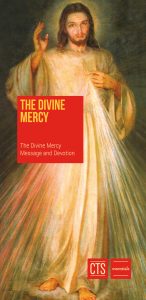 This blog is extracted from our leaflet The Divine Mercy. Based on revelations to St Faustina for Trust in God and Mercy towards others, the forms of this devotion, are included here in one handy leaflet: The Feast of Mercy, The Image of Merciful Jesus, The Chaplet, The Hour of Mercy and Spreading the devotion to Divine Mercy.
This blog is extracted from our leaflet The Divine Mercy. Based on revelations to St Faustina for Trust in God and Mercy towards others, the forms of this devotion, are included here in one handy leaflet: The Feast of Mercy, The Image of Merciful Jesus, The Chaplet, The Hour of Mercy and Spreading the devotion to Divine Mercy.
To learn more about the Divine Mercy devotion and to support the mission of CTS, order your copy of The Divine Mercy today.
